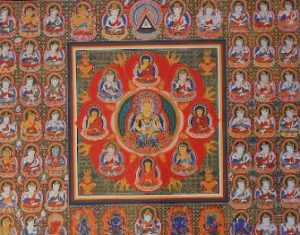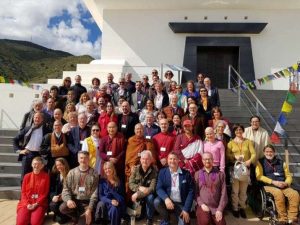
Khyentse Foundation, a nonprofit organization founded by the revered Bhutanese lama, filmmaker, and author Dzongsar Jamyang Khyentse Rinpoche, has announced the establishment of a new chair in Buddhist studies at the International Buddhist College in Thailand.
The Palyul-Khyentse Chair in Buddhist Textual Studies—set up with a the help of a matching fund from the Malaysia-based Buddhist foundation Yayasan Pema Norbu Vihara (YPNV), an official Palyul centre of Malaysia—will promote the study and teaching of Sanskrit Buddhism and its transmission to the Tibetan world.
“The landscape of Buddhist studies is changing in Asia, and especially in Southeast Asia, and the area has the potential to become a well-developed hub for the field. This is naturally a desirable development, considering the region’s Buddhist background,” Khyentse Foundation said in a statement shared with BDG. “Very significantly, this is the first chair in Buddhist studies that Khyentse Foundation has supported in Asia. This reflects an important reality on the ground: even beyond the field of Buddhist studies, Asian universities are becoming more prominent and Asian students are feeling less compelled to study in other parts of the world. Universities in Asia with similar focus and priorities are gradually forming scholarly networks that may be of no small benefit to Buddhist communities, whether monastic or lay, within Asia or beyond.”
Khyentse Foundation was founded by Dzongsar Khyentse Rinpoche in 2001 with the aim of promoting the Buddha’s teaching and supporting all traditions of Buddhist study and practice. The foundation’s activities include major text preservation and translation projects, support for monastic colleges in Asia, a worldwide scholarship and awards program, development of Buddhist studies at major universities, training and development for Buddhist teachers, and developing new modes of Dharma-inspired education for children.
The foundation also announced that the new chair had been assigned to Dr. Maria Vasylieva. Dr. Vasylieva, originally from Ukraine, holds a doctoral degree in political sciences from the National Academy of Sciences of Ukraine and is soon expected to complete a PhD in Buddhist philosophy at the International Buddhist College.
“Both her current field of specialization, requiring competence in different registers of Tibetan and Sanskrit, and her experience as an interpreter and a translator from Tibetan make her an ideal choice for the position,” said Khyentse Foundation. “Already a Dharma translator since 2011 and having translated Dzongsar Khyentse Rinpoche’s teachings in Ukraine in 2013, from 2013–19 Maria pursued in-depth studies in Buddhist philosophy and Tibetology at Rangjung Yeshe Institute (RYI) in Nepal and completed Esukhia’s full-immersion Tibetan-language program in Dharamsala, India, with the aspiration to become better qualified as a Dharma translator. Since graduating from RYI with a master’s in translation and textual interpretation in 2019, she has been translating for a traditional Buddhist philosophy course and teaching translation methodology at RYI.”

Image courtesy of KF
International Buddhist College (IBC) is a nonsectarian Buddhist university offering courses in all four major Buddhist languages: classical Chinese, Pali, Sanskrit, and Tibetan.
“We are grateful for the support received from foundations that, like the chair itself, honor the vast vision of two nonsectarian Buddhist masters—the late Penor Rinpoche and Dzongsar Khyentse Rinpoche—and to Maria, a scholar and teacher that we greatly admire,” Khyentse Foundation quoted Prof. Mattia Salvini, dean of graduate studies, at the International Buddhist College. “The chair gives us the opportunity to foster the in-depth training of coming generations of Buddhist scholars from all over the globe.”
Khyentse Foundation’s achievements over the last 20 years include more than 15 million pages of Buddhist texts preserved and made available online; education provided for the children of more than 1,000 families; support for Buddhist studies at more than 35 major universities through endowed chairs and professorships, graduate support, and the establishment of Buddhist studies centers; more than US$1 million in sponsorship for Buddhist teacher-training granted; sacred Buddhist texts translated into more than 15 languages, thanks to the efforts of 84000: Translating the Words of the Buddha, the Kumarajiva Project, and the Khyentse Vision Project; over US$1.8 million in funding granted to uphold Buddhism in its mother countries, including grassroots partnerships to revitalize interest in Buddhism in India; more than 2,000 scholarships and awards in recognition of excellence in Buddhist study and practice; support for over 3,000 monks and nuns to maintain the tradition of Buddhist scholarship in a monastic setting; and more than 120 open-access Ashoka and Trisong grants distributed to support Dharma and well-being programs.
“Khyentse Foundation wishes to thank Yayasan Pema Norbu Vihara for making this position possible—their support has extended over years of friendly and patient interaction and helpful advice,” the foundation shared. “In particular, the chair owes its existence to the extremely generous offering of the late Dr. Sim Koon Weng, through Yayasan. We will ensure that Dr. Sim’s contribution to the growth of the Dharma is amplified through our continued efforts.”

Born in Bhutan in 1961, Dzongsar Khyentse Rinpoche is the son of Thinley Norbu Rinpoche and was a close student of the Nyingma master Dilgo Khyentse Rinpoche (1910–91). He is recognized as the third incarnation of the 19th century Tibetan terton Jamyang Khyentse Wangpo (1820–1892), founder of the Khyentse lineage, and the immediate incarnation of Jamyang Khyentse Chökyi Lodrö (1893–1959).
In addition to Khyentse Foundation, his projects include Siddhartha’s Intent, an international collective of Buddhist groups supporting Rinpoche’s Buddhadharma activities by organizing teachings and retreats, distributing and archiving recorded teachings, and transcribing, editing, and translating manuscripts and practice texts; 84000, a non-profit global initiative to translate the words of the Buddha and make them available to all; Lotus Outreach, which directs a range of projects to ensure the education, health, and safety of vulnerable women and children in the developing world; and Lhomon Society, which promotes sustainable development in Bhutan through education.
See more
Khyentse Foundation
Yayasan Pema Norbu Vihara
International Buddhist College
Related news reports from BDG
Khyentse Foundation Supports Donation of Ancient Gandhari Buddhist Manuscripts to Pakistan
Khyentse Foundation Accepting Nominations for 2023 KF Award for Dissertation in Buddhist Studies
Prof. Luis Gómez, Prof. Paul Harrison Win Khyentse Foundation 2022 Prize for Outstanding Translation
Khyentse Foundation Honors Erik Pema Kunsang with 2022 Khyentse Fellowship
Khyentse Foundation Awards University of Sydney US$3.5 Million to Continue Funding Tibetan Buddhist Scholarship
Khyentse Foundation Presents 2022 KF Award for Outstanding PhD Dissertation in Buddhist Studies
Khyentse Foundation Marks 20 Years in the Service of the Buddhadharma
Windows into Buddhism: Khyentse Foundation Announces Launch of New Book and Website
Buddha Path Hostel: Khyentse Foundation Announces a New Short Film on the Buddhist Teaching
Khyentse Foundation’s Kumarajiva Project Shifts Focus to Training Translators
Khyentse Foundation’s Kumarajiva Project Marks 2nd Year with 7 Buddhist Texts Translated into Chinese
Khyentse Foundation Announces New Green Tara Sadhana eBook
Khyentse Foundation Launches Goodman Lecture Series
Khyentse Foundation Funds Tibetan Buddhist Studies Chair in Munich
Khyentse Foundation Launches New Initiative to Translate the Works of Jamyang Khyentse Wangpo
Khyentse Foundation Announces Online Publication of the Sutra of the Questions of Brahma in Chinese














